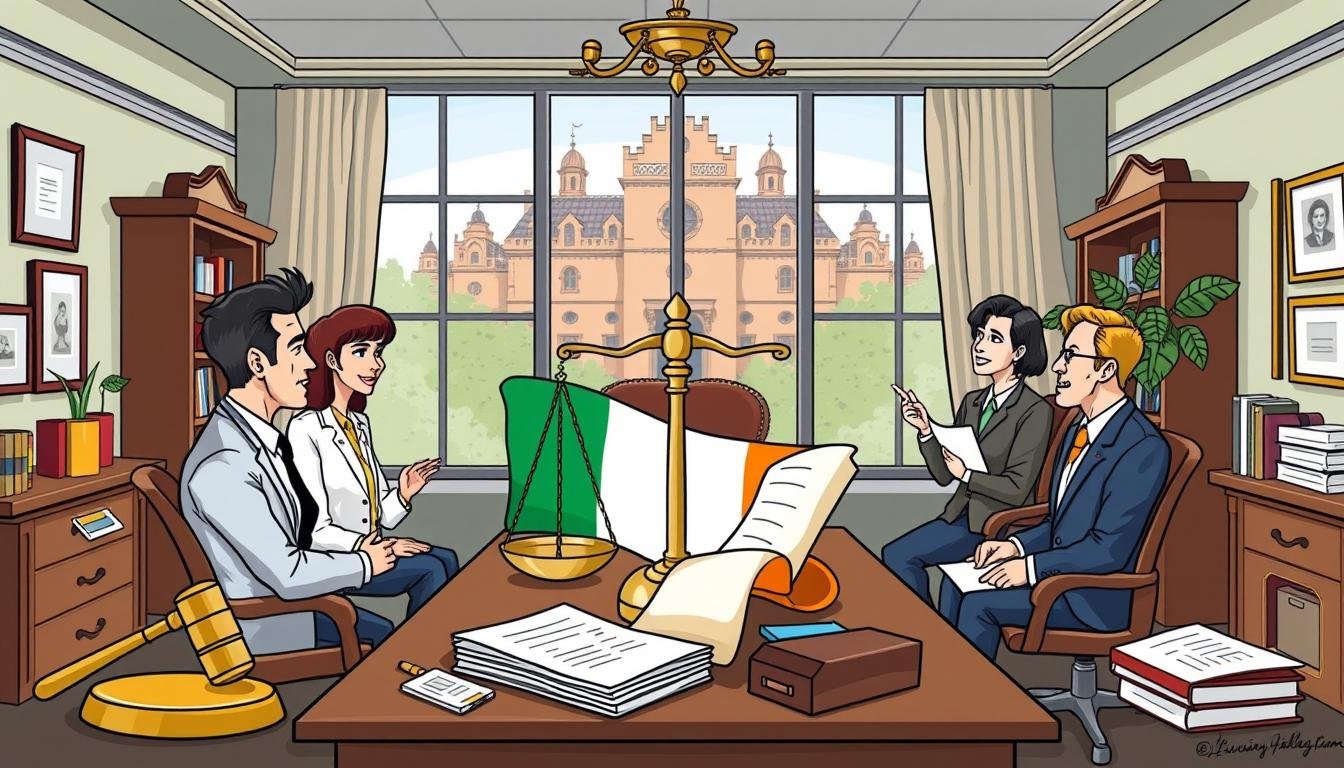Employment Laws in Ireland: Know Your Rights
Do you know your rights as an employee in Ireland? The laws here are complex, but don’t worry. This guide will help you understand your rights. We’ll cover everything from the minimum wage to leave entitlements.
Key Takeaways
- Ireland has a robust set of employment laws that safeguard worker rights and ensure workplace compliance.
- Employers must provide a written statement of employment terms and conditions within 2 months of hire.
- The National Minimum Wage Act 2000 entitles most employees to a minimum hourly rate.
- The Organisation of Working Time Act 1997 regulates work hours, breaks, and rest periods.
- Employees have access to various statutory leave entitlements, including annual, sick, and parental leave.
Introduction to Employment Laws in Ireland
Ireland has strong employment laws that protect workers. These laws cover many areas, like contract terms, working conditions, and leave benefits. It’s important for everyone to know these laws to keep the workplace fair and avoid legal problems.
Overview of Labor Regulations and Worker Protection
The worker protections in Ireland include many things, such as:
- Mandatory provision of employment details, including contract terms and job descriptions
- Restrictions on zero-hour contracts and enforcement of minimum payments
- Establishment of a national minimum wage
- Regulations on the distribution of tips, gratuities, and service charges
- Collective bargaining and employee representation in the absence of unions
- Maximum working hours, rest periods, and leave entitlements
Importance of Understanding Employment Rights
Knowing about employment rights in Ireland helps both workers and employers. It ensures everyone follows the law and works well together. This knowledge stops disputes, protects workers, and helps everyone work better together.
“Knowing your rights as an employee is essential in today’s dynamic labor market. Understanding the Irish labor laws can empower you to assert your entitlements and maintain a positive work-life balance.”
Contract of Employment and Information Obligations
In Ireland, employment contracts are key to the employer-employee relationship. The Terms of Employment (Information) Acts 1994-2014 require employers to share important job details. This includes a contract of employment, job description, pay rate, and working hours.
Terms of Employment (Information) Acts
These acts make sure employees get vital job info within five days of starting. Employers must give a written statement with basic employment details. This includes the names of both parties, job title, work location, contract length, pay rate, and working hours.
Employers also have to provide more details within a month. This includes pay schedules, leave, sick pay, and pension info. Not following these rules can lead to big fines for employers.
General Data Protection Regulation (GDPR)
The General Data Protection Regulation (GDPR) 2018 has changed how employee data is handled in Ireland. It gives employees more control over their personal info. Employers must handle employee data lawfully, transparently, and securely, following GDPR rules.
Knowing the employment and data protection laws helps both employers and employees in Ireland. It builds a strong work relationship and ensures legal compliance.
“Protecting employee data and ensuring transparency in employment contracts are essential for fostering a positive and productive work environment in Ireland.”
Working Hours, Minimum Wage, and Pay Regulations
In Ireland, laws protect workers’ rights well. They cover working hours, minimum wage, and payslip rules. These rules help keep labor fair and open across many industries.
Employment (Miscellaneous Provisions) Act 2018
The Employment (Miscellaneous Provisions) Act 2018 is key for worker’s rights. It stops most zero-hour contracts, making sure jobs match work hours. Employers must give new hires their job details within five days.
National Minimum Wage Act 2000
The National Minimum Wage Act 2000 sets Ireland’s minimum wage. Workers over 20 get €11.30 an hour. Those under 18 get €7.91, and 18-19 year olds get €9.04 and €10.17, respectively.
Payment of Wages Act 1991
The Payment of Wages Act 1991 ensures workers get a payslip. It shows their gross pay and any deductions. Employers must give a written payslip with each payment.
These laws in Ireland make sure workers are treated right. They earn enough to live on and know their pay and hours clearly.
Employment Laws in Ireland
Irish employment laws cover important areas. These include the Minimum Notice and Terms of Employment Acts, the Industrial Relations (Amendment) Act 2015, and the Organisation of Working Time Act 1997. These laws protect the rights and interests of employees in Ireland.
Minimum Notice and Terms of Employment Acts
The Minimum Notice and Terms of Employment Acts set out the minimum notice period for ending employment. This ensures employees get enough notice before their job ends. It helps them make necessary arrangements.
Industrial Relations (Amendment) Act 2015
The Industrial Relations (Amendment) Act 2015 helps workers improve their terms and conditions of employment. It does this even if collective bargaining is not recognized by their employer. This law supports employees’ rights to fair working conditions.
Organisation of Working Time Act 1997
The Organisation of Working Time Act 1997 sets rules for working time regulations in Ireland. It includes rest breaks, leave entitlements, and other important provisions. This ensures employees get enough rest and leisure time, promoting a healthy work-life balance.
These employment laws in Ireland are key to protecting workers’ rights and well-being. They cover everything from notice of termination to fair working conditions and work-time regulations.
Statutory Leave Entitlements
Ireland’s employment laws offer various leave entitlements. These help employees balance work and personal life. They protect jobs during maternity, paternity, adoption, parental, carer’s, and sick leave.
Maternity, Paternity, and Adoptive Leave
Eligible employees in Ireland get up to 26 weeks of maternity leave. They also get 2 weeks of paternity leave and 24 weeks of adoptive leave. These periods let parents care for their newborn or adopted child while keeping their job.
Parental Leave and Parent’s Leave
Ireland’s laws also offer parental leave of up to 26 weeks and parent’s leave of 9 weeks. These allow parents to take time off to care for their children in the early years.
Carer’s Leave and Sick Leave
Employees can take carer’s leave to care for a family member or loved one. The leave can last from 13 to 104 weeks. They also get sick leave, usually 5 days a year, for illness or medical treatment.
These leave entitlements in Ireland support employees in balancing work and life. They ensure job security during important life events.
Equality and Anti-Discrimination Laws
Ireland is dedicated to equal opportunities and stopping employment discrimination. The Employment Equality Acts 1998-2015 make this clear. These laws ban discrimination in work based on nine areas: gender, civil status, family status, age, race, religion, disability, sexual orientation, and being part of the Traveller community.
Employers must treat all employees equally and stop any harassment. This means protecting workers from bad behavior by colleagues, clients, or others they deal with.
Sexual harassment and harassment based on any of the nine protected grounds are strictly forbidden. Any unwanted behavior that makes someone feel bad or uncomfortable is seen as discrimination.
Employers must do their best to stop harassment and discrimination. They can be blamed if their employees act badly. This means they need good policies and ways to handle these problems.
The Acts also say employers must make reasonable accommodations for people with disabilities. This ensures they have the same chances in work, training, and activities.
It’s also important that the laws protect workers who speak out against discrimination. This includes those who make claims or complain about their employer.
“Equality and anti-discrimination laws in Ireland play a crucial role in promoting fairness, diversity, and inclusion in the workplace.”
Health, Safety, and Employee Welfare
In Ireland, the Safety, Health and Welfare at Work Act 2005 protects employees at work. This law makes sure employers keep their workplaces safe and healthy for everyone.
Employer Obligations Under the Act
Employers in Ireland must do several things under the 2005 Act. These include:
- Ensuring the safety, health, and welfare of employees at work
- Managing work activities to prevent improper conduct that may put employees at risk
- Providing safe workplaces, equipment, and systems of work
- Conducting thorough risk assessments and maintaining a written Safety Statement
- Appointing competent persons to handle employee protection and safety functions
- Providing information, instruction, training, and supervision to employees
- Establishing emergency plans and procedures for serious and imminent dangers
The Act also requires employers to give employees time off for safety awareness training. It also makes sure there’s teamwork between those in charge and safety reps.
“Employers have a legal duty to prevent bullying and harassment in the workplace, following specific procedures in case of complaints.”
Following the Safety, Health and Welfare at Work Act 2005 is key for workplace safety Ireland and employee welfare Ireland. By doing their part, employers can make sure their workplaces are safe and healthy for their staff.
Employment Rights for Specific Groups
In Ireland, certain workers get special protections. This includes part-time, fixed-term, and agency workers. These laws make sure they get the same rights as full-time workers.
Part-Time Employees
The Protection of Employees (Part-Time Work) Act 2001 protects part-time workers. It says they must get the same pay and benefits as full-time workers. Employers can’t treat them unfairly just because they work part-time.
Fixed-Term Employees
The Protection of Employees (Fixed-Term Work) Act 2003 helps fixed-term workers. It makes sure they get the same treatment as permanent workers. Employers must have good reasons for using fixed-term contracts.
Agency Workers
The Protection of Employees (Temporary Agency Work) Acts 2012–2021 protect agency workers. They must get the same rights as if they were hired directly. Employers can’t stop them from getting permanent jobs.
These laws in Ireland make sure part-time workers Ireland, fixed-term employees Ireland, and agency workers Ireland are treated fairly. They get the same chances as full-time workers.
“The Department of Business, Enterprise and Innovation in Ireland oversees the promotion of employment rights, workplace safety, and efficient markets through smart regulation and support for harmony in industrial relations, as well as addressing disputes efficiently.”
Whistleblowing and Protected Disclosures
The Protected Disclosures Act 2014 in Ireland is key for protecting workers who speak up about wrongdoings. This law, made stronger by the Protected Disclosures (Amendment) Act 2022, helps keep whistleblowers safe from backlash.
This Act covers many types of wrongdoings, like crimes and health threats. It also protects a wide range of people, including employees, contractors, volunteers, and job seekers.
Strengthening Whistleblower Protections
The 2022 changes to the Act have made whistleblower protections better. These updates match Ireland’s laws with the EU Whistleblowing Directive. The main improvements are:
- Mandatory internal reporting channels and procedures for certain organizations
- Strict timelines for handling protected disclosures
- Expanded protections for anonymous whistleblowers
- Increased compensation for victims of penalization
Now, whistleblowers in Ireland can report wrongdoings through their employer, certain authorities, or the Office of the Protected Disclosures Commissioner. They can do this knowing their identity will be kept secret.
The Protected Disclosures Act 2014 and its updates show Ireland’s dedication to openness and responsibility at work. This law helps whistleblowers speak up safely. It’s crucial for good governance and protecting the public.
Transfer of Undertakings and Redundancy
In Ireland, laws protect workers when a business changes hands or when jobs are cut. The European Communities (Protection of Employees on Transfer of Undertakings) Regulations 2003 keep workers’ rights safe during business changes. The Redundancy Payments Acts 1967-2014 make sure workers get a fair amount of money if they lose their job.
European Communities (Protection of Employees on Transfer of Undertakings) Regulations 2003
The TUPE Regulations, or TUPE for short, cover many workers in Ireland. This includes regular employees, apprentices, and even civil servants. These rules say the new boss must keep the same team and their jobs after a business change.
Workers can’t be fired just because the business changes hands. The old boss must tell workers about the change at least 30 days before. They must explain why the change is happening and what it means for the workers. But, pensions don’t move to the new employer, and benefits for older workers must stay the same.
Redundancy Payments Acts
The Redundancy Payments Acts 1967-2014 set out the rules for when jobs are cut. Employers must follow certain steps when firing workers. Workers also have the right to fight unfair firings.
Understanding transfer of undertakings Ireland and redundancy laws Ireland can be tough. Getting help from experts like Lavelle Partners can make a big difference. They can help make sure workers’ rights are looked after during big changes in the workplace.
Conclusion
This article has given a detailed look at Ireland’s employment laws and rules. It covers many topics to ensure fairness and follow the law at work. This includes contract terms, working conditions, leave, equality, health and safety, and rights for certain groups.
The Irish work laws are strong and aim to protect workers, keep workplaces safe, and improve work relations. Knowing these summary of employment laws Ireland helps people at work and businesses to stay on the right track.
As work changes, it’s key for employers and employees to keep up with Irish employment law. By understanding these summary of employment laws Ireland, we can create a better, fairer, and more successful work environment for all.
Source Links
- Employee Rights in Ireland – Border People
- Employment law
- Employment laws in Ireland
- 10 Things You Need to Know About Irish Employment and Labor Laws
- Employment law in Ireland
- Contract of employment
- Employee Rights in Ireland | Boundless EOR
- Working conditions & Working hours in Ireland | L&E Global
- Working hours
- Working Hours & Breaks
- Employers’ obligations in Ireland
- Annual Leave
- Employees’ rights and entitlements
- A Complete Guide to Annual Leave in Ireland – The HR Suite
- Equality laws in Ireland
- Equality in the workplace
- Anti-discrimination laws & legislation in Ireland | L&E Global
- Safety, Health and Welfare at Work Act 2005
- Health and safety at work
- Employment law Ireland | L&E Global
- Employment Laws and Employee Rights | Peninsula Ireland
- Protection for whistleblowers
- Protection of Whistleblowers
- Transfer of business (TUPE)
- Transfer of Undertakings
- Transfer of Undertakings (TUPE) advice for Employees – Lavelle Partners
- Living and working conditions: Ireland
- Ending an employment








